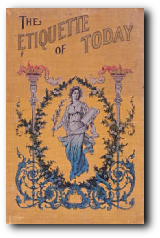


“Hospitality is a great pleasure to people of a sociable nature, and its obligations have a most refining influence. The generous consideration of others reaches its acme when one is constantly entertaining little circles of friends, with no thought but to give happiness.”
Edith. B. Orday

Etiquette of Today
Author: Edith B. Orday Published: 1918
Personality
Family Etiquette
Conversation and Correspondence
Casual Meetings and Calls
The Personal Card and the Engraved Invitation
Behavior in Public
The Art of Being a Guest
Duties of Host and Hostess
Duties of the Chaperon
Etiquette of the Marriage Engagement
The Conduct of a Wedding
Etiquette for Children
Etiquette of Mourning
Military, Naval, and Flag Etiquette

CHAPTER X
DUTIES OF THE CHAPERON
THE need of the chaperon is recognized in communities where there are large populations, and people are necessarily of many classes and unknown to one another. For this reason the system of chaperonage of the small communities of rural America has not been as elaborate or as strictly adhered to as that of the cities.
The chaperon is the accepted guardian of very young girls, taking oversight of them in their social life as soon as the governess gives up her charge. The chaperon is only a poor substitute for the rightful care of a mother, or takes the place of a mother when the latter cannot be present, or performs in the person of one the duties of several mothers.
Young girls should never go about the streets of a city or large town unaccompanied by an older person or a maid. This rule is not so much for physical protection as for the example of teaching her that fine conduct and discretion which will forestall the possibility of unpleasant experiences.
When a group of young people go to some public place of amusement or instruction, an older person should always accompany them. Such an attendant, who should be one of the fathers or mothers of the young people, if possible, would be in so great sympathy with the spirit of the group that his presence would impose no restraint and spoil no fun, yet it would be a curb on undue or undignified gaiety, and a protection against criticism.
The day is not very far distant when it was expected that if a daughter entertained a young man in the drawing-room, her father or mother would be present during the whole of the call. For débutante daughters the custom still holds good. For a daughter who has been out in society for one or more seasons, it seems somewhat rigorous and unnecessary, as the presence of the father or mother for a part of the call serves all the purposes of cordiality, and gives, as well, the young people a chance to talk without constraint of interests which seem perhaps foolish and trivial to any but young people. The wise father and mother or chaperon know when to trust young people, and when it is best to throw them quite upon their honor. It is only by having responsibility for their actions thrust thus upon them, that they ever attain to natural dignity and self-reliance.
It is sometimes permitted to a young woman to be escorted to a party or entertainment alone by a young man, but only by one who is well-known to the family as quite to be trusted, and only to such parties as are presided over by responsible patronesses. This should be exceptional for any but the young woman who has been left without immediate family and who has been already in society more than one season. The duenna who acts as her natural guardian and chaperon, ordinarily accompanies her.
It may be objected that there are large numbers of young women who are of necessity unprotected by adequate chaperonage,--through loss of relatives, financial limitations, or the following of some business calling or profession,--and that they are not, in general, treated with less respect than the young woman carefully guarded in her home. It yet remains true that the independent girl must needs provide for herself a chaperon upon certain occasions, or lose that consideration which she would keep at all costs. A strong character welcomes the aid of a careful observance of conventions.
Even the spinster of recognized professional standing finds herself somewhat restricted in social pleasures. She cannot go out socially with one man more than occasionally; she has little pleasure in going unattended; she can entertain but infrequently and in a small way, if at all, and never without an older married woman to assist her. She may, however, have her regular afternoon or evening "At Home," provided she has with her this friend; and with that friend present, she may entertain a gentleman caller until ten o'clock in the evening, but she may not offer him cigarettes, nor any beverage but tea, coffee, chocolate, or lemonade.
In fashionable life in the cities, the chaperon is an important and ever-present personage. Wherever the young débutante goes in society,--to every place of amusement, when walking or driving in the park, when shopping or calling,--and during her calling hours at home, the chaperon is her faithful and interested attendant.
The common usage of smaller towns, seashore places, and country villages differs in degree of attendance. The only wise rule is to follow the custom of the place in which one may happen to be, remembering always that the principle at the basis of the custom is wise and valuable, and that there should be good and sufficient reason for failing to follow it in its entirety. It is, however, not the letter of the law but the spirit of it which saves. Experience shows that not always the completely chaperoned girl is safe and the quite-free girl in real danger. Everything depends upon the girl, and the spirit of the chaperonage she receives. The relations with one's chaperon should be the most intimate and reliable and trustworthy of one's whole life; or they may be a mere farce and evasion. As a rule, however, too strict observance of the dictates of society in this connection is better than too lax.
The careless way in which many parents allow their sons and daughters to go off with a group of boys and girls of their own age, unattended by any adult, is to be deplored. Among the parents of several young people there certainly is some parent, who cares enough about his children and their associates to become a chum, and be at once a magnet to draw them to more mature and valuable ways of thinking, and a safeguard against that group folly towards which the irresponsibility of youth tends.
Until a girl makes her début in society, she is not seen at a party of adults except in her own home, and not there at a formal entertainment unless it be a birthday party, a marriage, or a christening.
Even after an engagement is announced, the chaperon is still the attendant of the young couple in fashionable circles, when they go to any place of public amusement.
2011 © Church Growth Associates, Inc.